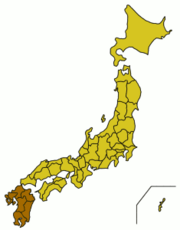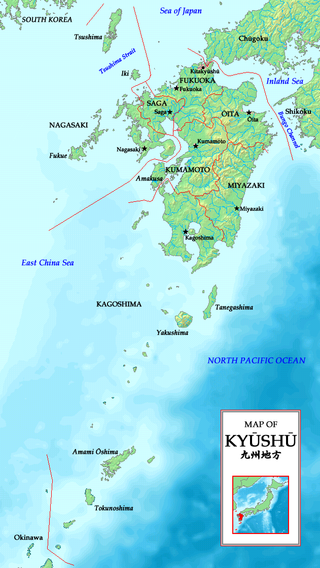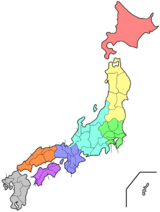Kyūshū
| Native name: 九州 | |
|---|---|
 Kyūshū region of Japan and the current prefectures on the island of Kyūshū |
|
| Geography | |
| Location | East Asia |
| Archipelago | Japanese Archipelago |
| Area | 35,640 km2 (13,761 sq mi) |
| Area rank | 37th |
| Highest elevation | 1,788 m (5,866 ft) |
| Highest point | Kujū-san[1] |
| Country | |
|
Japan
|
|
| Prefectures | Fukuoka, Kagoshima, Kumamoto, Miyazaki, Nagasaki, Ōita, Saga |
| Largest city | Fukuoka |
| Demographics | |
| Population | 13,231,995 |
| Density | 332.38 /km2 (860.86 /sq mi) |
| Ethnic groups | Japanese |
Kyūshū (九州 Nine Provinces)[2] or Kyushu is the third largest island of Japan and most southwesterly of its four main islands. Its alternate ancient names include Kyūkoku (九国 Nine States), Chinzei (鎮西 West of the Pacified Area), and Tsukushi-no-shima (筑紫島 Island of Tsukushi). The historical regional name Saikaidō (西海道 West Sea Circuit) referred to Kyūshū and its surrounding islands.
Kyūshū has a population of 13,231,995 (2006) and covers 35,640 square kilometres (13,760 sq mi).
Contents |
Geography
The island is mountainous, and Japan's most active volcano, Mt Aso at 1,591 metres (5,220 ft), is on Kyūshū. There are many other signs of tectonic activity, including numerous areas of hot springs. The most famous of these are in Beppu, on the east shore, and around Mt. Aso, in central Kyūshū.
The name Kyūshū comes from the nine ancient provinces of Saikaidō situated on the island: Chikuzen, Chikugo, Hizen, Higo, Buzen, Bungo, Hyūga, Osumi, and Satsuma.
Today’s Kyūshū Region (九州地方 kyūshū-chihō) is a politically defined region that consists of the seven prefectures on the island of Kyūshū and also Okinawa Prefecture to the south:
- Northern Kyushu
- Kagoshima Prefecture
- Miyazaki Prefecture
- Okinawa Prefecture
The world’s 37th largest island by area, Kyūshū is smaller than Spitsbergen but larger than New Britain and Taiwan. By population, it ranks 13th, having fewer inhabitants than Borneo or Sulawesi, but more than Salsette or Cuba.
Economy and climate

Parts of Kyūshū have a subtropical climate, particularly Miyazaki and Kagoshima prefectures. Major agricultural products are rice, tea, tobacco, sweet potatoes, and soy; silk is also widely produced. The island is noted for various types of porcelain, including Arita, Imari, Satsuma, and Karatsu. Heavy industry is concentrated in the north around Fukuoka, Kitakyushu, Nagasaki, and Oita and includes chemicals, automobiles, semiconductors, and metal processing.
In 2010 the graduate employment rate in the region was the lowest nationwide, at 88.9% [1]
Education
Major universities and colleges in Kyūshū:
- National universities
- Universities run by local governments
- University of Kitakyushu
- Kyushu Dental College
- Fukuoka Women's University
- Fukuoka Prefectural University
- Siebold University of Nagasaki
- Nagasaki Prefectural University
- Oita University of Nursing and Health Sciences
- Prefectural University of Kumamoto
- Miyazaki Municipal University
- Miyazaki Prefectural Nursing University
- Okinawa Prefectural University of Arts
- Major private universities
- Fukuoka University - University with the largest number of students in Kyūshū
- Kumamoto Gakuen University
- Ritsumeikan Asia Pacific University [4]
- Seinan Gakuin University
- Kyūshū Sangyo University - Baseball Team won the National Championship in 2005
- University of Occupational and Environmental Health
- Kurume University
See also
- Geography of Japan
- List of regions in Japan
- Azumi (people), an ancient group of people who inhabited parts of northern Kyūshū
Notes and references
- ↑ "Kujū-san, Japan". Peakbagger.com. http://www.peakbagger.com/peak.aspx?pid=10923.
- ↑ "Nine Provinces" may also refer to Jiuzhou, a historical division of China
|
|||||||||||||||||||||||||||||||||
